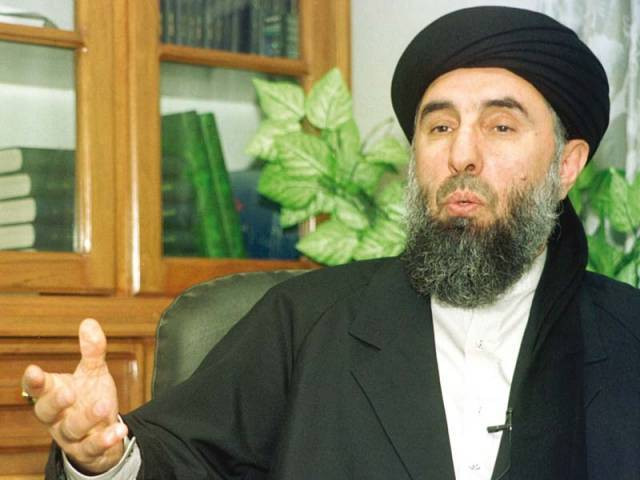HIA takes pole position for talks with govt
After Taliban ups its offensive, second largest resistance comes to the fore for peace

Gulbuddin Hekmatyar. PHOTO: FILE
The possible agreement has raised hopes in the war-torn country and assumed greater importance after the Taliban turned down repeated calls for peace negotiations.
Afghan peace process: Islamabad denies holding Taliban under its thumb
Senior officials of the government-backed High Peace Council have said a draft of the peace agreement with the HIA has been finalised and will be formally signed after the latter’s chief, Gulbuddin Hekmatyar, gives his nod of approval. Qazi Hakim Hakim, a top negotiator for HIA, told The Express Tribune the draft was sent to Hekmatyar for approval.
A question of implications
The possible deal is significant as it says HIA will formally cease all militant activities and function as a political party. It will pave the way for Hekmatyar to play an active political role in Afghanistan.
According to the 25-point draft of the deal, Afghan President Ashraf Ghani will grant immunity to Hekmatyar from judicial prosecution for previous military and political actions. This will be done through a special decree. The peace agreement could isolate the Taliban and mount further pressure on its leaders to review their policies and come to the negotiation table.
It was widely debated in Afghanistan that the Taliban wanted to establish control over more areas during the ongoing “spring offensive” and reach the table in a stronger position.
However, there has been no significant change on the ground since they have launched the annual fighting season two months ago. They are yet to succeed in overrunning the northern cities of Kunduz and Lashkar Gah in the southern province of Helmand. Meanwhile, Kabul claims to have inflicted losses on the Taliban as they are also involved in their own offensive, codenamed “Shafaq”.
Sartaj Aziz, foreign affairs adviser to prime minister, shared similar sentiments about the outcome of the Taliban offensive. Aziz told reporters in Islamabad last week that there is no change on the ground as the militants have not achieved any significant gains. He believes if the situation remains the same over the coming days, there could be a strong possibility for the beginning of peace talks.
People in Afghanistan are hopeful about the possible agreement and its positive impact on the security situation. Afghan Chief Executive Dr Abdullah Abdullah is a known rival of Hekmatyar for his Northern Alliance. However, he is upbeat over the proposed reconciliation and told journalists this week he will have a “meal” with Hekmatyar for national interest. He also said the whole Afghan nation will welcome the move if HIA and the government ink a peace accord.
On the international level, the United States and Pakistan have also welcomed the development.
“Pakistan welcomes any and every effort which brings militant groups to the negotiation table,” Foreign Ministry Spokesperson Nafees Zakaria said during his weekly briefing on Thursday when asked to comment.
Over the last two months, the HIA and HPC representatives had been involved in consultations in Kabul over a 25-point draft of the agreement proposed by the former.
Ghani has agreed and the consent of Hekmatyar, whose whereabouts are unknown, is anxiously awaited. It was Hekmatyar who had personally allowed his group to enter dialogue with the national unity government in March after the Taliban publicly refused to sit in direct talks with the quartet of Afghanistan, China, Pakistan and the US.
Pakistan hosts meeting on reviving Afghan Taliban talks
The HIA constituted a two-member committee to take part in talks as the Quadrilateral Coordination Group (QCG), in its February 23 meeting in Kabul, invited the Taliban and other groups by the first week of March.
However, the Taliban Qatar office rejected the QCG’s suggestion, and also stepped up attacks with the launch of their annual fighting season.
Another positive development this week was the anxiously-awaited meeting of the QCG in Islamabad. Although there had not been any major success in the fifth round of the grouping, the meeting itself was seen as a positive development as many in Afghanistan raised questions after Ghani announced a major shift to focus on war instead of talks with the Taliban.
Published in The Express Tribune, May 21st, 2016.













COMMENTS
Comments are moderated and generally will be posted if they are on-topic and not abusive.
For more information, please see our Comments FAQ